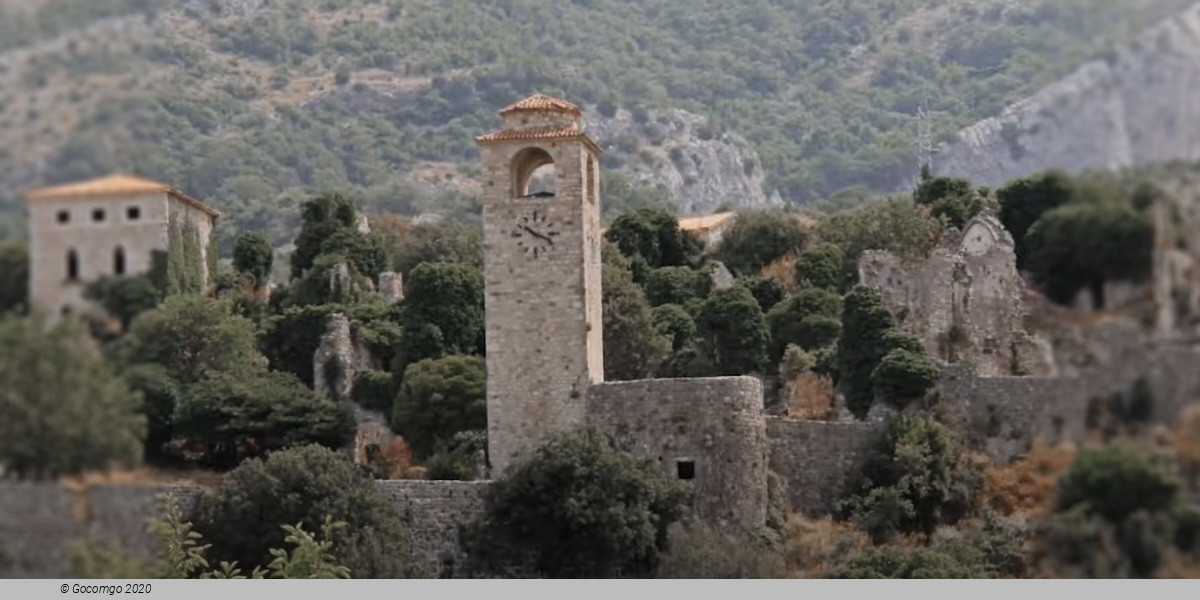Bar

Bar is a coastal town and seaport in southern Montenegro. It is the capital of the Bar Municipality and a center for tourism. According to the 2011 census, the city proper had 17,649 inhabitants, while the total population of Bar Municipality was 42,068.
History
Ancient times
Local archaeological findings date to the Neolithic era. It is assumed that Bar was mentioned as the reconstructed Roman castle, Antipargal, in the 6th century. The name Antibarium was quoted for the first time in the 10th century.
Middle Ages
In the 6th and 7th centuries, Slavs occupied the Balkans. Duklja, a Slavic, or Serbian state, was mentioned in the 10th century. Jovan Vladimir (ruler 1000–1016), of Skadarska Krajina is the first ruler of Duklja whose history is known. Stefan Vojislav (ruler 1018–1043), the eponymous founder of the Vojislavljević dynasty, defeated the Byzantines in a battle on a hill near Bar. He made Bar his seat of power. Vojislav then expanded the area under his rule. Mihailo I of Duklja (ruler 1050–1081), Vojislav's son, established the Archdiocese of Antivari. He continued to fight the Byzantines in order to secure the town's independence. This led to a union of states known as the Serbian Grand Principality. From 1101 to 1166, the principality was ruled by the Vukanović dynasty. However, for much of this time, Bar was under Byzantine rule. In 1183, Stefan Nemanja conquered and destroyed Bar which remained under Serbian control until the death of Dušan (1355).
Venetian and Ottoman period
From 1443 to 1571, the region was ruled by the Venice who called it Antivari, and it was part of the Albania Veneta. It was a town with its own coat of arms, flag, statute and mint. In 1571, the Ottomans captured Antivari and held the town until 1878. The archdiocese was preserved. With Ottoman conquest Catholic Church in border area and Archdiocese of Bar began to collapse because indigenous peoples begin migrate and Ottomans to that area brought new ethnic and religious element. Because of a lack of Catholic priests, entire parishes were converted to Orthodoxy. One of the archbishops during this period was Andrija Zmajević. The Ottomans ceded Antivari to Montenegro at the Treaty of Berlin. Montenegro renamed the town Bar, although virtually everyone else, including their powerful neighbours, Italy and Austria-Hungary, continued to name it Antivari.
Developments
Guglielmo Marconi, the Italian scientist and pioneer in wireless telegraphy, using Nikola Tesla's patented technology, made a radio connection between Antivari and Bari on 30 August 1904. In 1908, the first railroad in this part of the Balkans was put into operation there.
Wars
On 8 August 1914 Austria-Hungary responded to Montenegro's declaration of war by sending their protected cruisers SMS Zenta and SMS Szigetvár accompanied by the destroyer SMS Uskoke and torpedo boat 72F to conduct an unopposed bombardment of the port of Antivari, targeting its wireless station and harbour facilities. They were driven away by coastal batteries and destroyed only a wireless station. The Austrians declared a formal bockade of the Montenegrin coastline on August 10. On August 16, SMS Zenta and an accompanying destroyer were ambushed and trapped off Antivari by a very large French fleet (over twelve battleships), and in the subsequent battle of Antivari the Zenta was sunk with considerable loss of life. The destroyer escaped. On the 18 September following, the Austro-Hungarian coastal battleship SMS Budapest with supporting warships bombarded Antivari, the port and facilities, causing major damage, and on October 17–18 the destroyers SMS Scharfschutze, SMS Streiter and SMS Ulan bombarded Antivari's harbour. On November 18 the destroyer SMS Uskoke also conducted a brief bombardment. The Austrians made their largest raid to date on the evening and night of 1–2 March 1915 when their destroyers SMS Csikós, SMS Streiter, and SMS Ulan covered a raid by three torpedo-boats into Antivari harbour. The latter destroyed the main wharf and stocks of food and ammunitions along the waterfront, and captured the Montenegrin royal yacht Rumija, which was later torpedoed. The destruction of the wharves prevented larger ships from unloading supplies at the port restricting Allied shipments of food and munitions to the Montenegrin army. The Allies realised that with the Austro-Hungarian naval base of Cattaro close by there was little they could do.
Earthquake
In 1979, there was an earthquake that devastated Bar. It has since been rebuilt.

